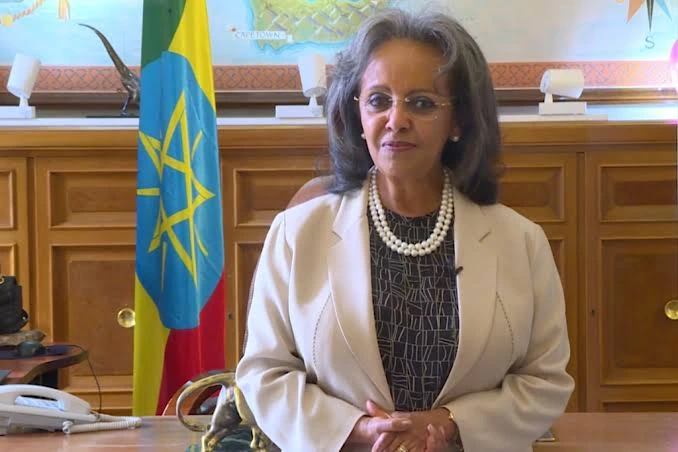
Ethiopia’s First Female President Sahle-Work Zewde Resigns Amid Tensions with Prime Minister

Ethiopian President Sahle-Work Zewde resigned from office on Monday following a speculated disagreement with Prime Minister Abiy Ahmed.
Sahle-Work, the first woman to hold the ceremonial role in Ethiopia, has been head of state since 2018, representing a significant milestone for gender equality in the country’s politics.
Her resignation is seen as a reflection of the deepening internal tensions within the government, particularly with Abiy Ahmed.
Though the president’s office holds limited power in Ethiopia’s political system, Sahle-Work’s departure raises questions about the state of diplomacy and leadership in the country.
Sahle-Work, a former United Nations official with a career in international diplomacy, handed over power to her successor, Taye Atske Selassie, in a brief ceremony held in Addis Ababa.
Taye, who has served as Ethiopia’s foreign minister since February and was the country’s representative to the United Nations, was approved by the Federal House of People’s Representatives to take on the role of president.
The resignation comes after a cryptic message posted by Sahle-Work on X (formerly Twitter) on Saturday, suggesting dissatisfaction with her recent silence.

She had previously faced criticism for not speaking out more strongly on issues like gender-based violence during the civil war in Tigray. However, she consistently called for peace across the country.
It is believed she had growing concerns about ongoing conflicts in the Oromia and Amhara regions.
Read More:
- ASUU Blames Emefiele, Cardoso For Infrastructural Deficits In Federal Universities
- Despite Ignoring Smuggling Scandal, Nigeria Customs Service Acquires Surveillance Aircraft
- Burkina Faso: Eleven Convicted, Six Acquitted In Terrorism Case
Ahmed, who initially backed Sahle-Work’s appointment in 2018, hailed it as a breakthrough for women’s representation in Ethiopian politics. However, the reported falling out between the two highlights growing internal divisions.
About The Author
Related Articles
Asake Sets New Billboard Afrobeats Record as Chart Presence Grows
Asake has further cemented his place as one of Afrobeats’ most dominant...
ByWest Africa WeeklyJanuary 29, 2026Nigerians Lament PayPal’s Return as Old Wounds Resurface
PayPal’s reentry into Nigeria through a partnership with local fintech company Paga...
ByWest Africa WeeklyJanuary 29, 2026Tanzania Eyes Gold Sales as Aid Declines and Infrastructure Needs Grow
Tanzania is weighing plans to sell part of its gold reserves to...
ByWest Africa WeeklyJanuary 29, 2026Mali Tightens Grip on Explosives Supply With New Majority Stake
The Malian government has taken majority ownership of a civil explosives manufacturing...
ByWest Africa WeeklyJanuary 29, 2026












Leave a comment